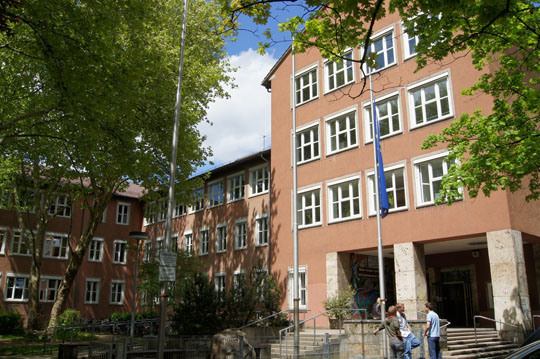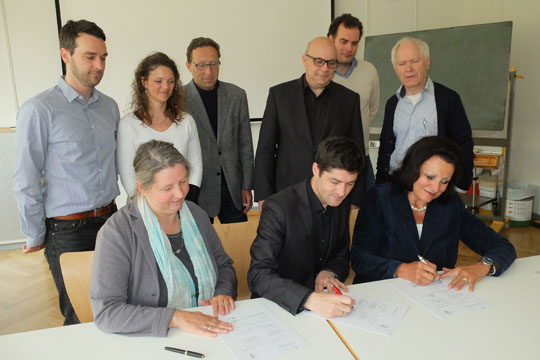Teacher training from a single mold
Freiburg, May 16, 2017
Collaboration between schools and universities has certain benefits: They promote a healthy exchange about the quality of instruction, prepare students for their future teaching profession and offer researchers the possibility to gain insights into the classroom setting and instruction. The Freiburg Advanced Center of Education (FACE) has just signed an agreement with its fifth partner school.
 The Walter-Eucken-Gymnasium and vocational schools open their doors to scientists. The collaboration enables a stronger link between theory and practice for future teachers.
The Walter-Eucken-Gymnasium and vocational schools open their doors to scientists. The collaboration enables a stronger link between theory and practice for future teachers.
Photo: Walter-Eucken-Gymnasium
Making a stronger link between theory and practice for future teachers: That is one of the goals of the FACE, the cooperative network at the University of Freiburg and the Freiburg University of Education. The institution recently started a mutually beneficial partnership with the Walker Eucken Gymnasium (WEG – school for college-bound students) "We want to guarantee future teachers an education from a single mold," says Dr. Martina von Gehlen, coordinator for the practical course at the FACE.
 Martina von Gehlen, Lars Holzäpfel and Claudia Feierling (left to right) signed the collaboration agreement.
Martina von Gehlen, Lars Holzäpfel and Claudia Feierling (left to right) signed the collaboration agreement.
Photo: Walter-Eucken-Gymnasium
In addition to the WEG, four additional schools are collaborating with the FACE: The Max Weber School, the Emil Thoma Realschule (trade school) and the Albert Schweitzer Werkrealschule (trade school) in Freiburg. The district college-bound school in Bad Krozingen has also signed a collaboration agreement. "We plan on gaining 10 to 12 university partner schools to systematically sound out the various levels of cooperation. Then even more schools will join us," explains von Gehlen.
Students, researchers and teachers will work together in the schools on various research projects. "It is important for our teaching staff to learn about the latest developments in education. By having contact with the universities, they are able to continue their education as well," says Claudia Feierling, school director at the WEG.
Visualizing mathematics
The first project at the WEG is already underway – it is being led by Prof. Dr. Lars Holzäpfel, Director of the practical course at the FACE and representative for the Center for school-oriented studies at the University of Education, Freiburg, with junior professor Dr. Anika Dreher of the doctoral study course "visualization in German and math instruction" at the University of Education. The focus here is to utilize visualizations in order to understand mathematics more completely. "A lot of upper classmates have difficulties with basic mathematical concepts such as percentages. They offer are missing aided recall with which they can make the connections and remember them," explains Holzäpfel. A total of 150 eleventh grades at the WEG have already participated in the pre-survey about their mathematical abilities.
The project combines both theory and practice: colleagues from the trade schools and the WEG meet together in a learning community, thereby engaging in a dialogue about various school forms. Researchers act as moderators during the process.
This effort illustrates how well every participant benefits from the collaboration, says Feierling. "The students are taught methods that can help them connect the dots better. The teachers receive fresh input as to how they can better integrate various methods of thinking and the students' needs into their classroom teaching." And future teachers benefit from the projects too. Along with an orientation internship and practice semester, they are able to conduct independent research in the schools and even write their theses about their school-oriented experiences.
All subjects
"Along with mathematics, all other subjects can also be addressed," emphasizes von Gehlen. For instance, German and foreign language instruction are being researched on other partner schools. The mathematics project at the WEG is only the beginning there too. "We are so lucky here in Freiburg because we have the University of Freiburg and the University of Education here. We definitely want to leverage that," says Feierling. But won't all these projects be too much for the high school students at one point? "We aren't able to do everything at once. As long as we inform the students in advance, take them seriously and show appreciation for them, they will stick with it too."
Julia Dannehl

